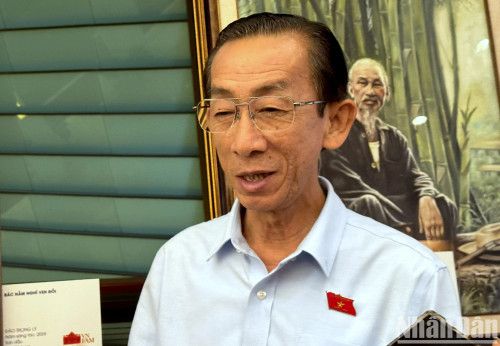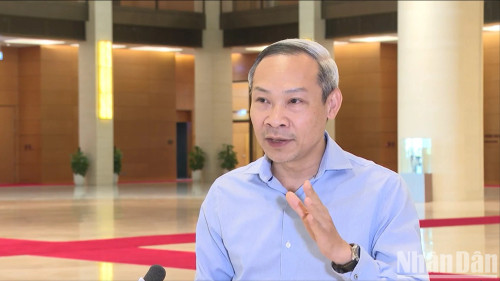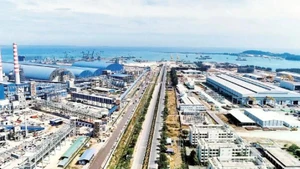With the spirit of eliminating prejudices and creating breakthrough conditions, the resolution is the Party’s strong affirmation about the key role and leading important driving force of the private economic sector in the country's development process.
However, to realise the spirit of the resolution, making the private economic sector the leading flag on the economic front, it is not only necessary to change thinking and policies, but also to need strong reforms in institutions, implementation mechanisms and a transparent and effective business ecosystem that accompanies enterprises.
Need for a “leading” private enterprise generation
After nearly 40 years of implementing the Doi Moi policy, the role of the private economic sector in the Vietnamese economy has been increasingly affirmed. With more than 940,000 private enterprises, five million business households and tens of millions of workers, this sector has contributed about 50% of GDP, 30% of budget revenue and more than 80% of jobs for society.
However, for a long time, the private economy has been placed in a “secondary” position, lacking real equality in access to resources, information, land, and credit. The inconsistent situation between policies and actual implementation has eroded the business community’s trust at times.
Therefore, the issuance of Resolution 68 by the Politburo is considered a turning point in development thinking, as it not only affirms the position and pivotal role of the private economy but also commits to improving the institutional environment, removing barriers, and creating conditions for the sector to make a breakthrough in the new era.
On the sidelines of the 9th Session of the 15th National Assembly (NA), many NA deputies expressed their consensus and optimism about the future development of the private economic sector after Resolution 68 was issued.
 |
| Associate Professor, Dr Tran Hoang Ngan, NA deputy of the Ho Chi Minh City NA Delegation (Photo: NDO) |
"The private economy has always been an important driving force of the national economy. This resolution sets the goal that by 2030, this sector must become the most important driving force of the economy. That is a strategic shift," Associate Professor, Dr Tran Hoang Ngan, NA deputy of the Ho Chi Minh City NA Delegation, told reporters on the NA sidelines.
According to Ngan, to achieve that goal, there must be many preferential, strong policies to help form large-scale private corporations, strong enough to lead and compete domestically and internationally, such as VinGroup, Sun Group, THACO, and Hoa Phat.
"We cannot expect to lead the economy with only small- and medium-sized enterprises. If we want millions of private enterprises to develop the country, we must find a way to stimulate policies for the current enterprises to grow into large corporations and groups such as THACO, VinGroup, Sun Group, and Hoa Phat", said Ngan.
Although the private economy currently contributes 50% of GDP, accounts for 82% of the workforce and 30% of the budget revenue, NA deputies noted that there are still many barriers preventing this sector from developing commensurate with its potential. That is why Resolution 68 calls for vigorously unblocking resources, removing institutional barriers and creating policy leverage to support private enterprises to make breakthroughs.
Ngan emphasised that to bring Resolution 68 to life, it is important to legalise major policies, synchronise the legal system, and remove the current "jungle of overlapping laws".
He affirmed that it is an objective necessity to have preferential mechanisms and institutions for the private economy. Resolution 68 was issued with that desire and need. To translate major policies into practice, it is necessary to legalise the Party and State's viewpoints on private economic development, and at this session, the NA discussed law amendments. The requirement is to innovate and reflect the Party and State's thinking and policies in the law.
“When the Party issues a policy, we must quickly revise legal regulations to align with it and eliminate the current ‘jungle of laws’. Only then can the private sector develop, businesses and entrepreneurs devote more time and energy to science, technology, and innovation,” he said.
Creating a legal framework for businesses to develop healthily
Associate Professor Dr Hoang Van Cuong, member of the NA's Economic and Financial Committee, member of the Ha Noi NA deputy delegate, said that Resolution 68 is comprehensive. It not only confirms that the private economic sector is the most important driving force of the national economy and the backbone of building an independent, self-reliant economy led by private economic groups, but also sets out specific solutions to develop the private economy.
“I believe the resolution contains clear breakthroughs, reflected in its detailed and specific action solutions, such as shifting from a pre-approval mechanism to post-approval, allowing businesses to operate more freely,” Dr Cuong said.
According to him, the post-approval mechanism is a fundamental shift in thinking. It means businesses can invest and develop operations freely according to their capacity and legal regulations, without needing permission or undergoing time-consuming and costly preliminary procedures that hinder market entry. At the same time, the State still conducts monitoring and inspection via a post-approval mechanism to ensure fair competition and legal compliance.
“Effective, law-abiding businesses will be recognised, while those engaging in unfair competition will be penalised. This is a new, breakthrough institutional change, enabling private enterprises to invest with peace of mind, without fear of criminalising economic relations,” Dr Cuong added.
He explained that when private businesses or entrepreneurs commit violations causing economic harm, they must make restitution, sometimes exceeding their gains. This discourages abuse for profit while reassuring that unintentional damages will not be criminalised. Using economic tools instead of administrative measures, from the beginning, allows entrepreneurs the chance to correct mistakes.
“If handled criminally, businesses lose opportunities and worry about their long-term development path. These are very new, breakthrough ideas that help the private sector, especially those who are bold and willing to take risks, to drive growth,” he stressed.
 |
| NA Deputy Phan Duc Hieu, member of the NA’s Economic Committee, member of Thai Binh NA Deputy Delegation (Photo: NDO) |
Sharing this view, NA Deputy Phan Duc Hieu, member of the NA’s Economic Committee, member of Thai Binh NA Deputy Delegation, affirmed that Resolution 68 reduces red tape for businesses, especially private ones, by shifting from pre-approval to post-approval mechanisms and affirming that enterprises and citizens are allowed to do anything not prohibited by law. It also promotes the principle of not criminalising economic relations.
According to him, risks and mistakes are unavoidable in business. Resolution 68 highlights the priority of applying civil, economic, and administrative measures first, allowing businesses and entrepreneurs to correct their mistakes. This provides a second chance for businesspeople.
“When violations occur in unclear legal areas, state agencies must guide businesses on how to comply. The idea is that economic violations should primarily be handled through civil law and administrative violation penalty laws for these ‘grey zones’ of the law,” he said.
Another highly praised provision is the separation of legal responsibilities between individuals and legal entities in handling violations. He noted that in many recent cases, handling individuals can affect businesses, affecting jobs, social assets, and unfinished projects.
“In several recent cases, the wrongdoing was committed by individuals, not the businesses. It is crucial to distinguish this because behind each individual are enterprises, social assets, jobs, and ongoing projects that risk being wasted,” he affirmed.
Awaiting a revolution in implementation
Another important issue raised by deputies is the need for drastic reform in policy implementation, particularly administrative procedures related to investment, construction, land, and the environment, areas that businesses frequently find cumbersome.
Hieu noted that, besides improving access to traditional resources and quick and effective dispute resolution mechanisms, the focus must be on how policies and administrative procedures for projects are implemented.
“Businesses must be able to access and process investment approvals, assessments, and licensing swiftly. We cannot accept that it takes as long or longer to obtain administrative approval than it does to build the project. That is a tremendous waste and a lost opportunity,” he explained.
Having worked with the private sector for over a decade, Nguyen Van Than from the NA Deputy Delegation of Thai Binh Province, Chairman of the Vietnam Association of Small and Medium Enterprises, shared that Resolution 68 has placed the private sector in its rightful role and mission. This sector now yearns for a transparent, open ecosystem for development.
He said that the Party Central Committee has issued four strategic resolutions: Resolution 57 on breakthroughs in science, technology, innovation, and digital transformation; Resolution 59 on international integration in the new context; Resolution 66 on reforming lawmaking and enforcement; and Resolution 68 on private economic development for the country’s socio-economic transformation.
“The Party has been very open in its thinking; the key thing now is implementation. Economic policies must be rooted in real-life understanding. Once the mindset is clear, the actions must also be coherent,” he said.
According to Than, the biggest concern remains policy implementation and changes or inconsistencies.
“Business is like a battlefield, and enterprises are the soldiers. For victory, alongside enterprises’ effort, it is necessary to have correct policies and synchronous and drastic policy implementation from authorities at all levels,” he affirmed.
He also urged cadres, civil servants, public employees and enterprises to share responsibility before the Party and people.
“The four Resolutions of the Politburo have addressed the key problem of apparatus and administration, while the implementation is practical management, taking place every day, every hour, so leaders and policy implementers must be close to the people and enterprises, understand and persevere to achieve results,” Than concluded.
Meanwhile, Deputy Hoang Van Cuong reiterated that despite being specific, resolutions and policy guidelines reflect the viewpoints of the Party and the Politburo. To take effect, these policies need to be institutionalised, first through legislation. In particular, it needs a revolution, a breakthrough in implementing policies, and bringing resolutions into life.
“What the Party laid out in Resolution 68 is clear. What’s needed now is a legal framework. Gaps in current law must be filled through decrees, circulars of the government, ministries and sectors and other guiding legal documents. This is the foundational framework that will provide businesses with a free ecosystem to develop,” Cuong emphasised.
















